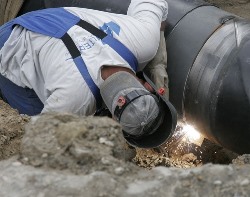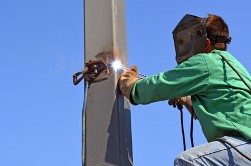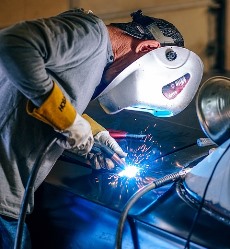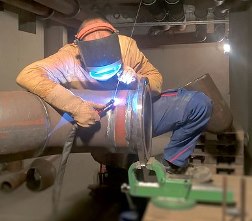How to Choose a Welding Training Class near Williamsburg Pennsylvania
 Enrolling in the ideal welding trade school near Williamsburg PA is an essential first step to beginning your new occupation as a professional welder. But since there are so many schools to pick from, how do you know which ones to consider? And more significantly, once you have fine tuned your options, how do you pick the right one? Many prospective students start by looking at the schools that are closest to their residences. When they have located those that are within commuting distance, they are drawn toward the cheapest one. Yes, location and the cost of tuition are necessary concerns when examining welder vocational schools, but they are not the only ones. Other concerns include such things as reputation, accreditation and job placement rates. So before starting your search for a vocational school to become a welder, it’s sensible to develop a list of qualifications that your selected school must have. But before we explore our due diligence checklist, let’s talk a little bit about how to become a welder.
Enrolling in the ideal welding trade school near Williamsburg PA is an essential first step to beginning your new occupation as a professional welder. But since there are so many schools to pick from, how do you know which ones to consider? And more significantly, once you have fine tuned your options, how do you pick the right one? Many prospective students start by looking at the schools that are closest to their residences. When they have located those that are within commuting distance, they are drawn toward the cheapest one. Yes, location and the cost of tuition are necessary concerns when examining welder vocational schools, but they are not the only ones. Other concerns include such things as reputation, accreditation and job placement rates. So before starting your search for a vocational school to become a welder, it’s sensible to develop a list of qualifications that your selected school must have. But before we explore our due diligence checklist, let’s talk a little bit about how to become a welder.
Welder Degree and Certificate Training
 There are a number of options available to receive training as a welder in a technical or trade school. You can earn a a certificate, a diploma or an Associate Degree. Bachelor Degrees are available in Welding Technology or Welding Engineering, but are more advanced courses than most journeyman welders will need. Some programs are also offered along with an apprenticeship program. Following are short summaries of the most prevalent welding programs available in the Williamsburg PA.
There are a number of options available to receive training as a welder in a technical or trade school. You can earn a a certificate, a diploma or an Associate Degree. Bachelor Degrees are available in Welding Technology or Welding Engineering, but are more advanced courses than most journeyman welders will need. Some programs are also offered along with an apprenticeship program. Following are short summaries of the most prevalent welding programs available in the Williamsburg PA.
- Certificate and Diploma Programs are usually made available by trade and technical schools and require about one year to complete. They are more hands-on training in nature, fashioned largely to teach welding skills. They can provide a good foundation for a new journeyman or apprentice welder, or additional skills for working welders.
- Associate Degree Programs will take two years to finish and are most often offered by community colleges. An Associate Degree in Welding Technology furnishes a more extensive education than the certificate or diploma while still furnishing the foundation that prepares students to enter the workforce.
A number of municipalities and states do have licensing requirements for welders, so make sure to check for your location of potential employment. If needed, the welder school you choose should prep you for any licensing examinations that you will need to pass in addition to providing the proper training to become a professional welder.
Welding Certification Options
 There are a number of organizations that offer welder certifications, which test the skill level and knowledge of those applying. A large number of Williamsburg PA employers not only require a certificate or degree from an accredited welding program, but also certification from a highly regarded organization like the American Welding Society (AWS). A variety of certifications are offered based on the kind of work that the welder does. A few of the skills that certification can acknowledge are the welder’s ability to
There are a number of organizations that offer welder certifications, which test the skill level and knowledge of those applying. A large number of Williamsburg PA employers not only require a certificate or degree from an accredited welding program, but also certification from a highly regarded organization like the American Welding Society (AWS). A variety of certifications are offered based on the kind of work that the welder does. A few of the skills that certification can acknowledge are the welder’s ability to
- Work in compliance with specific codes
- Work with specified metal thicknesses
- Work with specific kinds of welds
- Work in compliance with contract specifications
As already mentioned, various states, cities or local municipalities have licensing requirements for welders. Of those mandating licensing, many additionally require certification for various kinds of work. Certification is also a way to prove to employers that you are an exceptionally skilled and knowledgeable welder. So similarly as with licensing, look into the requirements for your location and confirm that the welder vocational school you select prepares you for certification as needed.
How to Pick a Welder Tech Program
 As soon as you have chosen the credential you would like to obtain, a diploma, certificate or degree, you can begin to evaluate schools. As you can imagine, there are numerous welder vocational and trade schools in the Williamsburg PA area. That’s why it’s important to determine in advance what qualifications your school of choice must have. We have previously discussed a couple of significant ones that most people consider first, which are location and the cost of tuition. As mentioned, although they are essential qualifiers, they are not the only ones that must be looked at. After all, the school you choose is going to provide the training that will be the foundation of your new profession as a welder. So below are more factors you might want to consider before picking a welding trade school.
As soon as you have chosen the credential you would like to obtain, a diploma, certificate or degree, you can begin to evaluate schools. As you can imagine, there are numerous welder vocational and trade schools in the Williamsburg PA area. That’s why it’s important to determine in advance what qualifications your school of choice must have. We have previously discussed a couple of significant ones that most people consider first, which are location and the cost of tuition. As mentioned, although they are essential qualifiers, they are not the only ones that must be looked at. After all, the school you choose is going to provide the training that will be the foundation of your new profession as a welder. So below are more factors you might want to consider before picking a welding trade school.
Accreditation. It’s very important that the welder trade school you decide on is accredited by either a regional or a national agency. There are two basic kinds of accreditation. The school may earn Institutional Accreditation based on all of their programs. Programmatic Accreditation is based on a specific program the school has, such as Welding Technology. So make sure that the program you select is accredited, not just the school itself. Additionally, the accreditation should be by a U.S. Department of Education recognized accrediting agency, such as the Accrediting Commission of Career Schools and Colleges of Technology (ACCSCT). Besides helping ensure that you get a quality education, the accreditation can also help in obtaining financial aid or student loans, which are often unavailable in Williamsburg PA for non-accredited schools. Finally, for those states or municipalities that mandate licensing, they may require that the welder training program be accredited as well.
Apprenticeship and Job Placement Programs. A large number of welding certificate or degree programs are offered combined with an apprenticeship program. Other schools will assist in placing you in an apprenticeship or a job upon graduation. Ask if the schools you are reviewing help in placing students in apprenticeships or have a job placement program. These schools must have associations with local unions and various metal working businesses to which they can refer their students. More established schools may have a larger network of graduates that they can utilize for referrals. These programs can help students find employment and establish associations within the Williamsburg PA welding community.
Job Placement and Completion Rates. The completion rate is the portion or percentage of students that enroll in an academic program and complete it. It’s crucial that the welding program you select has a higher completion rate. A lower rate could signify that the students who joined the program were unhappy with the instruction, the teachers, or the facilities, and quit. The job placement rate is also a good indicator of the quality of training. A higher job placement rate will not only confirm that the program has an excellent reputation within the industry, but also that it has the network of Williamsburg PA employer relationships to assist students obtain apprenticeships or employment upon graduation.
Up-to-date Facilities and Equipment. After you have narrowed down your selection of welder programs to two or three possibilities, you should think out going to the campuses to evaluate their facilities. Make sure that both the facilities and the equipment that you will be taught on are up-to-date. Specifically, the training equipment should be comparable to what you will be working with on the job. If you are unsure what to look for, and are currently in an apprenticeship program, ask the master welder you are working under for guidance. If not, ask a local Williamsburg PA welding professional if they can give you a few suggestions.
School Location. Although we previously briefly talked about the significance of location, there are a few additional issues that we should address. You should bear in mind that unless you can relocate, the welding program you pick must be within commuting distance of your Williamsburg PA home. If you do opt to enroll in an out-of-state school, besides moving costs there might be higher tuition fees for out-of-state residents. This is particularly the case for welder degree programs offered by community colleges. Also, if the school provides an apprenticeship or job placement program, more than likely their placements are within the school’s local community. So the location of the school needs to be in a region or state where you subsequently will wish to work.
Small Classes. Personalized instruction is essential for a manual trade such as welding. It’s easy to get lost in bigger classes and not receive much personalized training. Ask what the average class size is for the welder schools you are reviewing. Inquire if you can sit in on a couple of classes so that you can witness how much individual attention the students are receiving. While there, speak with several of the students and get their feedback. Also, chat with some of the teachers and ask what their welding experience has been and what certifications and credentials they hold.
Convenient Class Scheduling. Lots of folks learn a new trade while still employed at their present job. Confirm that the class schedules for the schools you are reviewing are flexible enough to fulfill your needs. If you can only attend classes in the evenings or on weekends near Williamsburg PA, confirm that the schools you are considering provide those alternatives. If you can only attend part-time, confirm that the school you decide on offers part-time enrollment. Also, ask what the policy is to make up classes should you miss any due to work, illness or family emergencies.
Will You Be Attending Welding School Near Williamsburg PA?
Perhaps you live in the Williamsburg Pennsylvania area, or have decided to enroll in a Welding Program that has a campus near there. In either case, you may find this bit of history both interesting and informative.
Williamsburg, Pennsylvania
On July 6, 1754 a treaty was signed at Albany, New York between the Iroquois and the William Penn heirs, opening up portions of the west for settlement. However, British policy forbid western expansion and was in effect until after the American Revolution.
On September 17, 1789, George Reynolds took out a patent from the Supreme Executive Council of Pennsylvania for a large tract of unsettled land surrounding the Big Spring which flows into the Juniata River.
The borough was founded in 1790 by Jacob Ake. Originally called Aketown, it is the oldest borough in the current borders of Blair County. The name change was in honor of William Ake, Jacob's son. By 1810, there were 34 houses in the village; the census of 1820 notes an inn, a distillery, and the presence of one slave. The Main Line of the Pennsylvania Canal was completed in 1832, and opened on November 28 when the packetboat "John Blair" left Huntingdon, for the west. The Blair County Children's Home was located in Williamsburg for many years until its destruction by fire. Today, the borough is approximately 30 blocks, centered on High and Second Streets. This comprises the Williamsburg Historic District, listed by the National Register of Historic Places in 1995.[3] Nearby places also listed are: Etna Furnace and the Daniel Royer House.[3]
Online Welder Training
 Welding is truly a manual kind of profession, and consequently not very suitable for online training. However, there are a small number of online welding classes offered by specific community colleges and technical schools in the greater Williamsburg PA area that may count toward a degree or certificate program. These courses primarily deal with such topics as reading blueprints, safety,, and metallurgy. They can help provide a beginner a foundation to begin their education and training. Nevertheless, the most important point is that you can’t learn how to weld or handle welding materials unless you actually do it. Clearly that can’t be done online. These skills must be learned in an on-campus setting or in an apprenticeship. Online or distance learning is better suited for seasoned welders that desire to advance their knowledge or perhaps attain a more advanced degree. So if you should find an online welding degree or certificate program, be very cautious and make certain that the larger part of the training is done on campus or in a workshop type of setting.
Welding is truly a manual kind of profession, and consequently not very suitable for online training. However, there are a small number of online welding classes offered by specific community colleges and technical schools in the greater Williamsburg PA area that may count toward a degree or certificate program. These courses primarily deal with such topics as reading blueprints, safety,, and metallurgy. They can help provide a beginner a foundation to begin their education and training. Nevertheless, the most important point is that you can’t learn how to weld or handle welding materials unless you actually do it. Clearly that can’t be done online. These skills must be learned in an on-campus setting or in an apprenticeship. Online or distance learning is better suited for seasoned welders that desire to advance their knowledge or perhaps attain a more advanced degree. So if you should find an online welding degree or certificate program, be very cautious and make certain that the larger part of the training is done on campus or in a workshop type of setting.
Find the Best Welding Technical School Williamsburg PA
Picking the right welder school will probably be the most critical decision you will make to begin your new profession. As we have addressed in this article, there are a number of factors that you will need to assess and compare among the programs you are looking at. It’s a must that any welder training program that you are assessing includes a good deal of hands-on instruction. Classes should be smaller in size and each student must have their own welding machine to train on. Classroom teaching needs to offer a real-world context, and the curriculum should be up-to-date and conform with industry standards. Programs vary in length and the kind of credential offered, so you will need to determine what length of program and credential will best fulfill your needs. Each program provides unique options for certification as well. Perhaps The ideal way to research your final list of schools is to go to each campus and talk with the teachers and students. Invest some time to monitor a few classes. Tour the campus and facilities. Make sure that you are confident that the school you decide on is the ideal one for you. With the right training, effort and dedication, the end result will be a new trade as a professional welder in Williamsburg PA.
